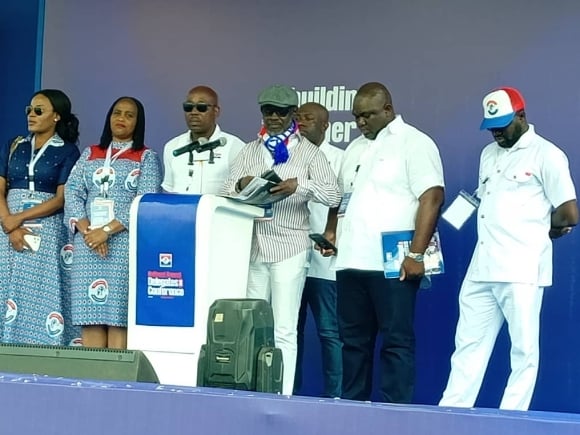Paragraph 1: The Resounding Rejection of the Youth Age Limit Amendment
The New Patriotic Party (NPP) National Delegates Conference, held on July 19th at the University of Ghana Stadium, witnessed a decisive rejection of a proposed amendment to redefine the party’s youth age limit. Motion 54, which sought to lower the youth age cap from 40 to 35, was met with overwhelming opposition from the over 5,500 delegates present. The resounding “NO” vote, delivered via a voice vote so forceful it rendered a headcount unnecessary, underscored the delegates’ firm stance against the proposed change. This decisive outcome effectively maintains the status quo, preserving the existing definition of youth within the NPP as members under 40 years of age.
Paragraph 2: The Rationale Behind the Proposed Amendment
The rationale for the proposed amendment, presented by Frank Davies, Chairman of the NPP Constitutional Amendment Committee, was anchored in aligning the party’s definition of youth with established global and national standards. Kojo Oppong Nkrumah, a prominent party figure, argued in favor of the change, citing various international benchmarks. He referenced the United Nations’ youth bracket of 15 to 24, the World Health Organization’s definition of 15 to 29, UNICEF’s alignment with the UN, and the African Youth Charter’s broader definition of 15 to 35. Furthermore, he pointed to Ghana’s National Youth Authority Act, which defines youth as individuals between 15 and 25, reinforcing the argument for a lower age limit within the NPP.
Paragraph 3: The Delegates’ Defiance of International Benchmarks
Despite the compelling arguments presented in favor of aligning with international and national standards, the NPP delegates remained unconvinced. Their resounding rejection of Motion 54 demonstrated a clear preference for retaining the existing 40-year age limit for youth membership. This decision, while diverging from established benchmarks, reflects the party’s unique internal dynamics and considerations. It suggests a prioritization of internal party priorities over strict adherence to external definitions of youth. The delegates’ choice underscores the significance of context-specific interpretations of youth within political organizations.
Paragraph 4: Implications of the Vote and Protection of Existing Youth Leadership
The delegates’ decision to maintain the 40-year age limit carries significant implications for the party’s youth wing. It safeguards the eligibility of current youth leaders who would have been aged out under the proposed amendment. This protection of existing leadership suggests a conscious effort to maintain stability and continuity within the youth ranks. Furthermore, the rejection of the motion signals a broader consensus within the party to maintain flexibility in grooming and developing emerging leaders. The decision to preserve the higher age limit provides a longer runway for younger members to gain experience and ascend within the party hierarchy.
Paragraph 5: The Constitutional Review Process and the Broader Context of the Conference
The vote on the youth age limit amendment was just one component of a comprehensive constitutional review process undertaken at the National Delegates Conference. Over 50 motions, distilled from over 300 proposals submitted nationwide, were under consideration. This extensive review process highlights the party’s commitment to internal reform and adaptation. The conference, themed “Rebuilding Together with Our Values,” takes place in the wake of the NPP’s loss in the 2024 general elections. This context underscores the significance of the conference as a pivotal moment for the party to re-evaluate its strategies, structures, and internal dynamics.
Paragraph 6: The Conference as a Platform for Renewal and Unity
The 2025 National Delegates Conference serves as a crucial platform for the NPP to embark on a journey of renewal and rebuilding. Following their electoral setback, the party is seeking to re-establish its core values, strengthen internal unity, and chart a course for future success. The constitutional review process, including the debate on the youth age limit, reflects the party’s commitment to internal reflection and adaptation. The outcome of the conference will undoubtedly shape the NPP’s trajectory in the coming years, influencing its approach to future elections and its overall role in Ghanaian politics. The conference signifies a moment of introspection and strategic repositioning for the party as it seeks to regain its footing and move forward cohesively.


